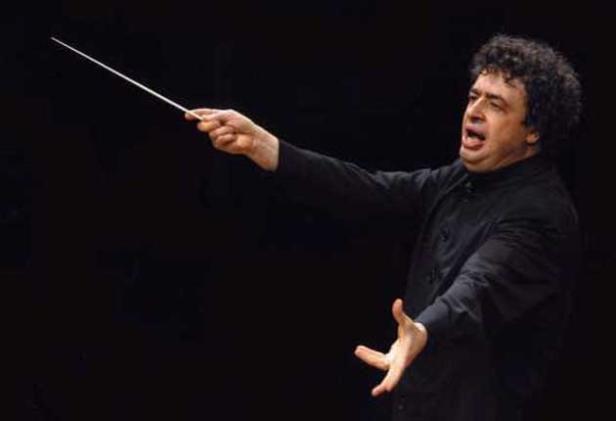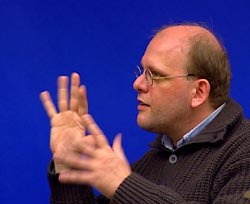Powerful American premiere and magnificent Mahler served up by Bychkov, Chicago Symphony

Semyon Bychkov led the Chicago Symphony Orchestra in music of Mahler and Detlev Glanert Thursday night. Photo: Thomas Kost
It’s a rare concert in which a popular Mahler symphony nearly gets upstaged by a contemporary work, particularly one written by a virtually unknown German composer.
But such was the case Thursday night when Semyon Bychkov and the Chicago Symphony Orchestra presented the U.S. premiere of Detlev Glanert’s Theatrum beastiarum, a brilliant, darkly exuberant work that made even jaded 21st-century ears prick up at Orchestra Hall.
The 49-year-old German composer is a student of Hans Werner Henze and his mentor’s influence is palpable in Glanert’s audacious scoring and whipcrack handling of large orchestral forces.
Theatrum beastiarum is a 22-minute symphonic companion piece to Glanert’s opera Caligula, which morphs the four-act opera’s assorted rapes, strangulations, poisonings and stabbings into a light-hearted musical frolic.
Just kidding. The music is bleak, dense and unremittingly powerful, opening with an extended 25-note chord that immediately catapults us into the twisted mind of the infamous Roman emperor.
Scored for massive orchestra, Glanert’s “dark and wild series of songs and dances for orchestra” proceeds from that jarring opening to a beast-like lowing in double-basses, set against gentle high solo violin. The music accelerates by fits and starts into an off-kilter Allegro. Harsh and jagged, there is a Shostakovich-like grotesquerie here yet Glanert’s style is more lithe and graceful.
Befitting its title, the music is theatrical but never ginned up purely for ostentatious effect. Unlike the over-hyped Yanov-Yanovsky Cello Concerto that debuted on the same stage last week, Glanert’s piece moves with a sense of organic purpose and musical integrity.
Halfway through, massive organ chords shake the house, followed by a pastoral calm with Buxtehude-like cool balm in the organ passages before the music gathers steam again, leaping woodwinds seguing into a crazed march-like pandemonium. The contrapuntal build-up becomes ever more violent and agitated punctuated by massive irregular chords, receding for a string quartet’s pleading phrases, an isle of humanity in a desolate landscape. (The quartet passage is by Shostakovich to whom the work is dedicated.)
This is terrific music, dynamic and individual, and scored with free-wheeling flair and imagination. Props to Bychkov and the CSO for bringing this American premiere to local audiences and for providing such an imposing debut from a composer whose work we need to hear more of.
Bychkov is clearly a thoughtful and discerning musician—see Michael Quinn’s interview with him this week on our CD page—and a man who is able to put an individual stamp on familiar music and inspire the CSO to follow him.
The Symphony No. 5 was the first music of Mahler performed by the orchestra (Frederick Stock, 1907) and has been a touchstone work for the CSO ever since. The Fifth has received countless performances by varied podium figures over the century from the fiery—Sir Georg Solti, whose partnership with the CSO was cemented by the first of his two Chicago recordings—to the less so, like Daniel Barenboim’s amorphous Wagnerian trudge.
Bychkov and the CSO delivered a refined, magnificent performance that managed to provide an interesting new slant. With all the varied interpretive takes on this mighty tripartite journey from darkness to light, Thursday’s reading still found something new to say.
Bychkov eschewed the bombastic Russian-style Mahler road taken by many of his compatriots for a decidedly Viennese take, spacious yet with elegance and precision. Without any self-conscious mannerisms, Bychkov’s Mahler was full of wonderful things: the pensive, unsettled string playing in the main theme of the opening funeral, the idiomatic lilt to the waltz-like theme of the second movement and the radiant opening up of the brass chorale near its coda.
The Scherzo’s jaunty horn interjections were assayed by the CSO’s principal more fluently and with more character than has been the case for much of this season. Bychkov took the Adagietto at a flowing pace, avoiding overwrought sentiment and making this celebrated string music the lightly songful expression of love for Alma that the composer clearly desired.
Many conductors just barrel through the finale for superficial thrills, but here too Bychkov ensured the excitement didn’t peak too soon, giving the contrasting episodes their full scale without diluting the hectic joie de vivre of the final bars.
In one of the CSO’s finest nights of this season, the orchestra played with customary muscle, gleam and expressive nuance, one bad horn bobble at the start of the final movement apart. Chris Martin was primus inter pares with trumpet playing that was a wonder to hear.
There is only one more performance Saturday night and this CSO program is not to be missed.
The program will be repeated 8 p.m. Saturday. www.cso.org; 312-294-3000.
